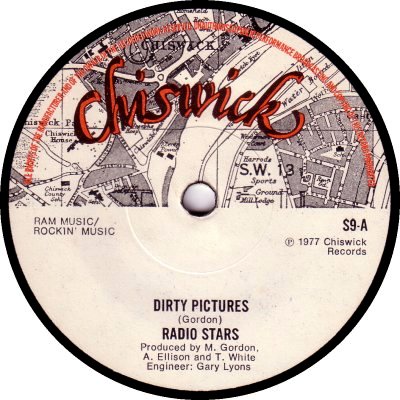
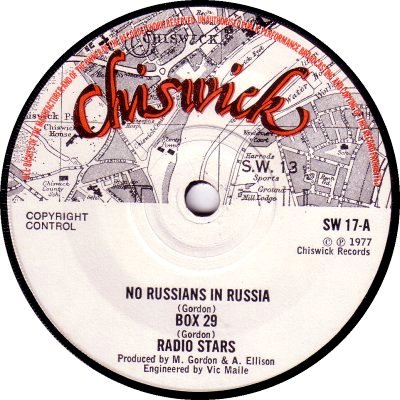
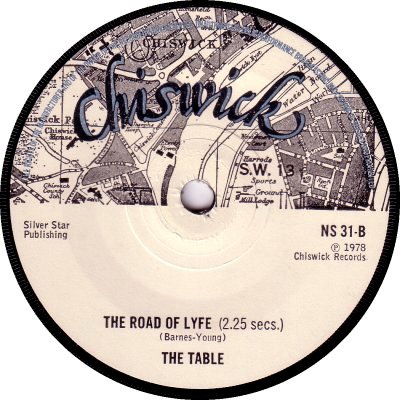
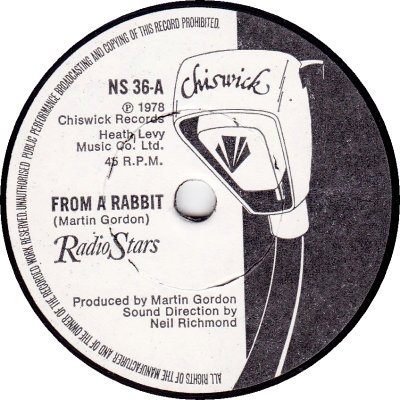
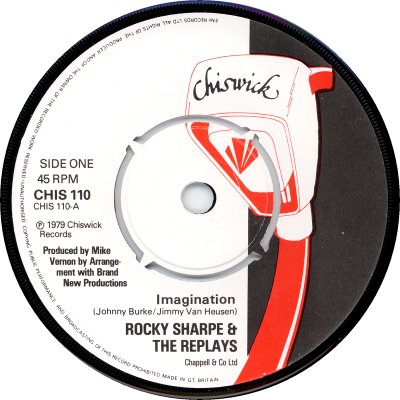
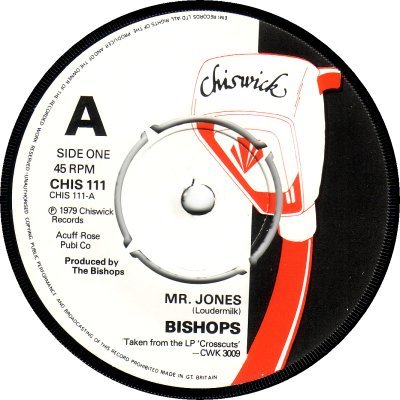
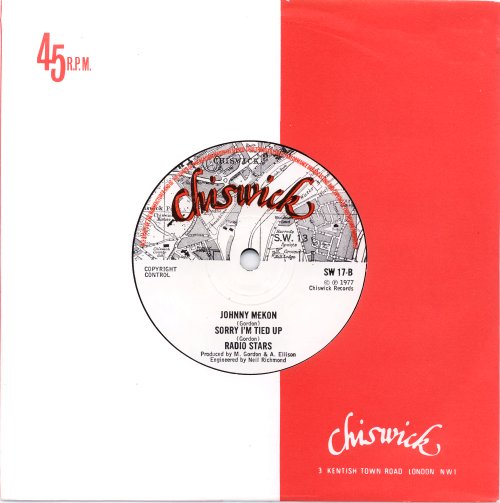
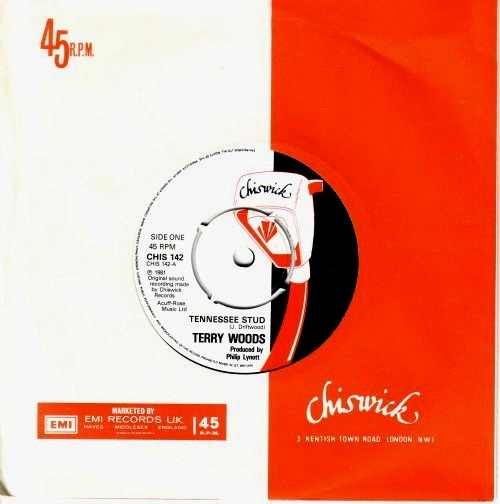
The Chiswick record company was started by Ted Carroll and Roger Armstrong of 'Rock On' records as a logical progression from selling records from a stall in Soho market; they were joined by Trevor Churchill in fairly short order. It received its first mention in 'Music Week' in the issue of the 17th of April 1976, which said that the 'Rock On' chain of record shops had leased 'Brand New Cadillac' by Vince Taylor from EMI as a result of demand for it in the shops, and had arranged for President to distribute it. By that time the company had already got one record under its belt, a four-track EP by the Count Bishops, released in November the previous year. Armstrong is quoted as saying that Chiswick was aiming "to preserve and reactivate the best of Rock 'n' Roll". He mentioned the Count Bishops EP, and said that the distribution deal with President should be a great benefit. The article mentioned Trevor Churchill as being involved with the label, along with Carroll and Armstrong, so he was on board by that time. Other records followed, singles being numbered in an S-0 series, EPs sharing those numbers but having a 'W' after the 'S'. The deal with President was extended, and it lasted until the summer of 1977.
In July 1977 Chiswick signed a two-and-a-half year pressing and distribution deal with Anchor Records (q.v.). 'MW' of the 2nd of July said that previously the company had been responsible for getting its own pressings made, that President had only been responsible for distributing them, and that that agreement had been 'recently terminated'. A spokesman for Chiswick stated that the new deal was not a licensing one and that the company was retaining its independence, but that the big demand for its records meant that having responsibility for its own pressing was no longer viable. Chiswick's back catalogue would be available through Anchor, but the singles' prefix would be changed from 'S' to 'NS'; re-pressings of back catalogue singles would be given the new prefix. February 1978 saw the first deletions from that catalogue, 'MW' of the 4th of that month listing NSes 4, 5, 8, 9, 12 and 16 as being for the chop, along with RUFF-1, the latter being on the Thrust label (q.v.) an occasional Chiswick offshoot.
In the event the deal with Anchor was to last for just over a year, instead of the stipulated two-and-a-half years. 'MW' of the 2nd of September 1978 reported that Chiswick had signed a new deal - this time a licensing one - with EMI for its 'current product'. For records which weren't current, the company came up with a new label for licensed reissues, 'Ace' (q.v.), which they themselves would handle. 'MW' of the 11th of November broke the news about Ace, and added that reissues of old Chiswick product would appear on that label, but in the event reissues of Chiswick's own material eventually came out on a new label, 'Big Beat' (q.v.). Records that weren't covered by the EMI agreement were apparently provided for in parallel deals: 'Music Master' has the early Ace singles as being distributed by an independent company called Swift; then 'MW' of the 10th of March 1979 said that records that hadn't been licensed to EMI were available through Pinnacle (q.v.). A week later an advert in 'MW' of the 17th provided a list of the singles which Pinnacle was handling: they included some popular singles on the main label and all of the singles on Ace. The numbers listed were S2, S3, NSes 10, 13, 14, 25, 31, 33, 36, 38, 49 and 50, along with SWs 1, 6 and 17. I wonder if anybody apart from myself actually cares about this sort of thing. That was Chiswick's last mention in 'MW' of the 1979s, apart from an account of the launch of the 'Big Beat' label in the issue of the 4th of August 1979 - according to the article the label was intended for '60s reissues and other material of a 'similar specialist nature'. Chiswick entered the '80s as a member of the EMI family; releases of new recordings on the label seem to have been sporadic after 1982, but Ace took centre stage and developed into a large and well-respected reissue concern.
Chiswick was one of the first labels to issue Punk Rock records, with the likes of The Gorillas, Skrewdriver, and the Radiators From Space, and it enjoyed a fair amount of success in that field; after joining from Stiff Records (q.v.) The Damned took Chiswick into the charts on several occasions from 1979-80, albeit with diminishing placings. Other forms of Rock were catered for: Whirlwind provided traditional Rock 'n' Roll, the Radio Stars quirky 'New Wave', and Motorhead old-style headbanging. The Radio Stars nudged the Top 40 with 'Nervous Wreck' b/w 'Horrible Breath' (NS-23; 10/77), but the company's Chart regulars were Doo-Wop revival band Rocky Sharpe & The Replays, who proved five Top 60 singles, including two which got into the Top 20, from 1978-82.
Two label designs were used in the 1970s: the first, featuring a map (1), lasted until May 1978; the colour of the logo changed from red to blue late on, and several singles can be found in either colour, presumably as a result of re-pressings. In June 1978 the map design was replaced by a more contemporary one featuring a stylized record arm; this continued to be used in the EMI years (5). Promo copies weren't marked until the move to EMI, when a fairly discreet 'A' was added to their labels (6). Chiswick put out a few singles in 6" form; these were given black-and-white labels (4) - thanks to Paul Winsall for that scan. A company sleeve (7) was introduced when Chiswick linked up with Anchor; it gained a credit to EMI at the appropriate time (8). As for manufacturing, the President-distributed singles seem to have been by Lyntone or CBS pressings; several singles have both CBS-style and Lyntone matrix numbers. Anchor-era records were pressed by CBS, who pressed all Anchor's records at that time, while records licensed to EMI were naturally pressed by that company. According to 'Music Master', during the earlier President days distribution was also done by Lugton and H. R. Taylor, who seem to have generally handled President family labels at that time.
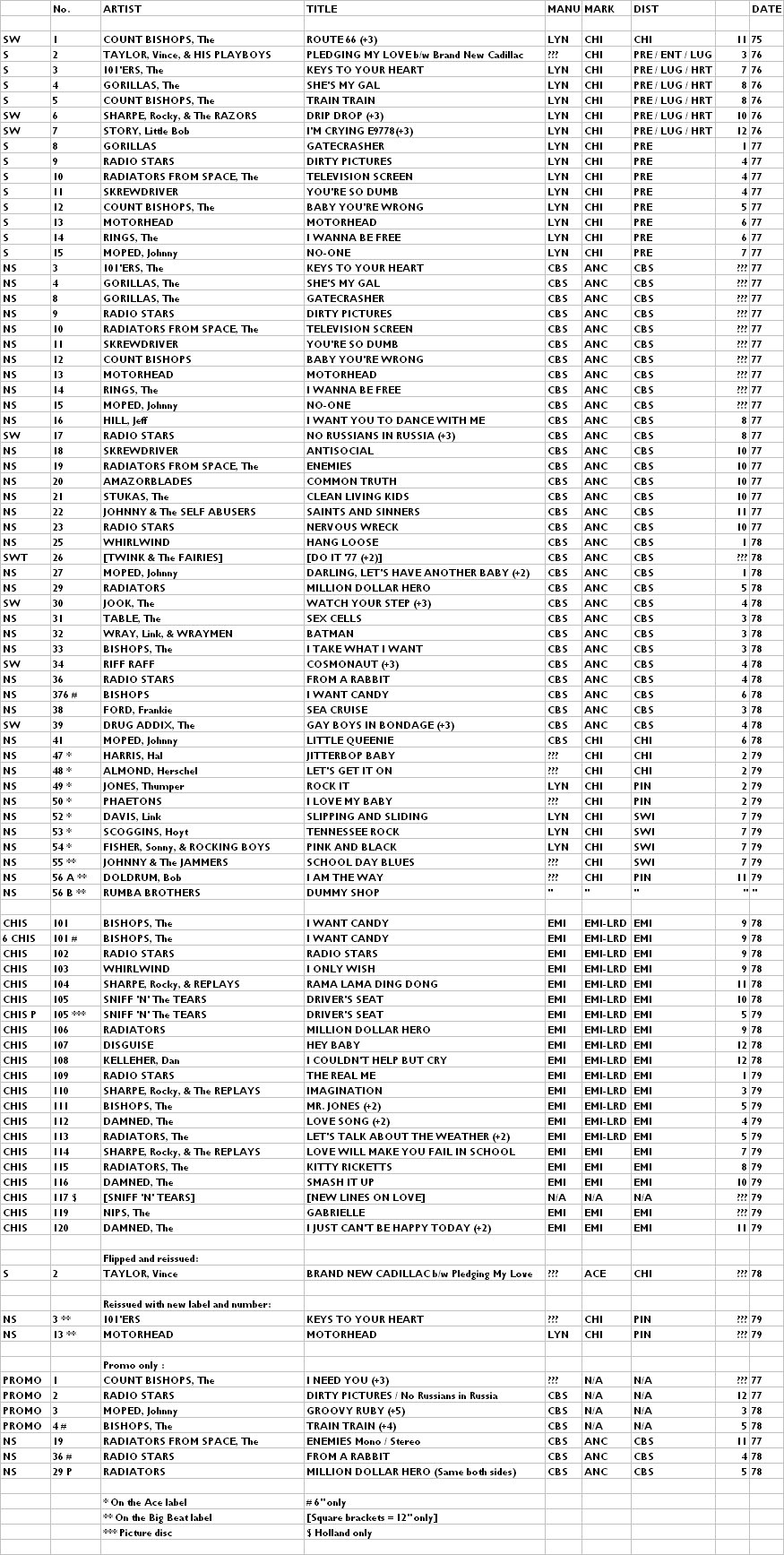


Copyright 2006 Robert Lyons.

